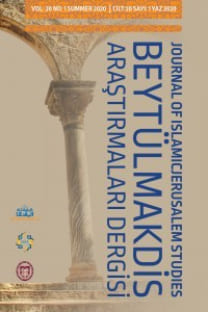Osmanlı Döneminde Kudüs'te Zaviyelerin Yayılması ve Gelişmesinde Vakıfların Rolü
The Role of Waqf in the spread and prosperity of the Al-Zawaya in Jerusalem during the Ottoman period
One of the main issues that attracted the attention of researchers in Islamic thought is the problem of Awqaf which has obtained the attention of many of the caliphs, sultans and Muslim rulers, which has also been reflected on modern and contemporary history. On the other hand, research and study in the educational aspect of the role of Awqaf (endowments) in the revival and development of Sufi institutions in Bayt al-Maqdis is in itself a filed in need for further study, research and investigation. This study attempts to show the great role played by Awqaf in the sustainability of the activity of any institution which has Waqf that it can rely on. It also explains how these Awqaf are managed and the meticulousness in its administrative structure and the diversity of jobs and employees, as well as the accuracy in the selection of employees from the Jerusalemite families who are known in the city and have a long history of working in the administration of Awqaf. Also how the endowers were competing to endow Awqaf to provide prominent service for people of knowledge and religion. It also found that in the absence of these endowments the continuity and sustainability of the work of these organisations would not be long-lasting and how they have contributed significantly to the spread of educational and Sufi activities in Jerusalem, which the Ottoman state supports and sponsors in its dominion. This in turn led to the spread of many Sufi movements in Al-Quds al-Sharif and many establishments served the Sufis who came from all over the Muslim World to gain the knowledge from scholars. Which led to the prosperity of the large number of endowments which supported them and have become a housing for devotees to follow the Sufi movements around the world and this in turn led to the enhancement of a human character of Muslims as well as the characteristics of tolerance which is confirmed by the Islamic religion. The Zawiyah thus became one of the most important centres for knowledge and Sufism in Bayt al-Maqdis, where devotees would come from numerous countries such as North Africa and India to study numerous sciences and memorise the Quran as well as for seclusion. The study acquired its data through reviewing, investigating and analysing the records of the al-Quds Islamic court archives during the Ottoman period, which contains important information which was the main source for the study as well comparing it with other references that dealt with this subject.
Keywords:
Zawiyah, al-Quds, Ottoman Authorities, Awqaf Sufism,
___
- Absherly, Al-Tamimi, Muhammad wa Muhammad Dawud. (1982) 'Awqaf wa Mumtalakat al-Muslimin fi Filastin fi alwwaya , al-Quds al-Sharif , Safid , Nabulus , Eijlawn , Wfqana lil-Kitab raqm 522 min Kutub al-Tahrir al-Eithmaniat al-musajilat fi al-Qarn al-Eashir al-hijrii, Istanbul
- Badawi, Abd al-Rahman. (1975) Tarikh al-Suwfiat al-Islamiyah min al- bidayat ila nihayat l-qarn al-ththani,al-Tabiq al-awal, Quwait: Wikalat al-Matbueat.
- Ibn Wasel, Jamal Al-Din Muhammad Bin Salem (1972) Mufarrej Al-Karoub in Akhbar Bani Ayoub, part 4, Cairo.
- Gibb, Hamilton and Bowen, Harold. (1977) Islamic Society and the West, and the Impact of Western Civilization on Islamic Thought in the Near East, translation: Abdul Majeed Al-Qaisi, 1st edition, 2c, Damascus.
- Al-Husseini, Hassan Abdel-Latif. (1985) Tafsir ‘ahl al- Quds fi al-Qarn al-thany ashr al-Hijri, Amman.
- Al-Hanbali, Abu al-Yaman Mujir al-Din, Al-Anas al-Jalil. (1968) fi Tarikh Quds wal-Khalil, al-Najaf
- Al-Khalili, Shams al-Din Muhammad bin Sharaf al-Din. (2005) Tarikh al-Quds Walkhalil, al-injaz: Mohammed EadnanAl-Bakheet wa Nofan Raja Al-Sawarya, London
- Al-Dabbagh, Mustafa Murad. (1982) Baladina, Filistin, Nablus.
- Al-Razi, Muhammad Abu Bakr Abd al-Qadir. (1967) Mukhtar Al-Sahah, Beirut.
- Al-Zawahreh, Tayseer Khalil. (1995) Tarikh al-Hayat al-İjtitimaeiat fi liwa Dimashq 1840-1864 m./1255- 1282h.
- Shams al-Din, Sami, Turkish Dictionary, 2c, (Istanbul, 1317 AH / 1899 CE). 13 - Al-Quds Sharia Court Records: They are pictured in the form of micro-film tapes kept in the movie thumbnail hall at the University of Jordan Library.
- Sherrab, Muhammad Muhammad Hassan, Mawsueat aş-Quds walmasjid al-Aqsa, Amman
- Salhiyyah, Muhammad Issa. (2002) al-Sijil al-Eaqariu liwa al-Quds, Amman
- Al-Aref, Aref. (1962) Tarikh al-Quds al-Mufassal, Quds.
- Abdel-Aal, Hassan Ibrahim. (1985) Fan al-Tarbiyah fi Badr al-Diyn bin Jumeat, Riyad
- Al-Asali, Kamel Jameel. (1983) Meahid al-eulum fi al-Quds, Amman
- Al-Asali, Kamel Jameel. (1982) ‘Aslafuna fi Bayt al- Quds, Amman
- Al-Asali, Kamel Jameel. “al-Quds taht Hakam al-euthmaniiyn”, al-Quds al-Sharif
- Gawanmeh, Youssef Darwish, “History of Beit al-Maqdis Prosecution,” Arab Journal of Culture, p. (1), year (2), (Tunis, 1982).
- Kurd Ali. (1927) Khutat al-Sham, Damascus
- Carmelite, Anastas Marie, Arab Money and Numismatics (Cairo, 1939).
- Muhebish, Ghassan. (1997) “al-Zawaya fi al-Quds”, Amman.
- Al-Madani, Ziad Abdel Aziz. (1996) Madinat al-Quds wa Jawaruha Khilal al-fatrat 1215-1245ha/1800-1830, Amman
- Najm et al., Raef Yousef. (1983) Kunuz al-Quds, Damascus
- Hunts, Walther. (1970)Pints and Islamic Weights in the Metric System, translation: Kamel Al-Asali, Amman.
- Al-Yaqoub, Muhammad Ahmad Salim. (1999) Janib al-Quds, Amman
- ISSN: 1367-1936
- Yayın Aralığı: Yılda 2 Sayı
- Başlangıç: 1997
- Yayıncı: Beytülmakdis Çalışmaları Vakfı
Sayıdaki Diğer Makaleler
OSMANLI KUDÜS’ÜNDE KAÇAKÇILIK FAALİYETLERİNE GENEL BİR BAKIŞ (1886-1914)
ARŞİV BELGELERİNE GÖRE FİLİSTİN’DE SALGIN HASTALIKLAR VE ALINAN ÖNLEMLER ÜZERİNE BİR DEĞERLENDİRME
Beytülmakdis'in Osmanlı Anıtları: Creswell'in 1919-1920 Arşiv Fotoğraf Koleksiyonunun İncelenmesi
XIX. YÜZYILIN İKİNCİ YARISINDA SİYONİSTLERİN FİLİSTİN’E YERLEŞMELERİNİN ENGELLENMESİ
Beytülmakdis'in Osmanlı Anıtları: Creswell'in 1919-1920 Arşiv Fotoğraf Koleksiyonunun İncelenmesi
Osmanlı Döneminde Kudüs'te Zaviyelerin Yayılması ve Gelişmesinde Vakıfların Rolü
KUDÜS’E GELEN RUS HACILARIN MÜRÛR TEZKİRESİ MESELESİ
KAISERSWERTHER DİYAKONEZLERİ'NİN KUDÜS'TEKİ FAALİYETLERİ VE TALİTHA KUMİ OKULU
